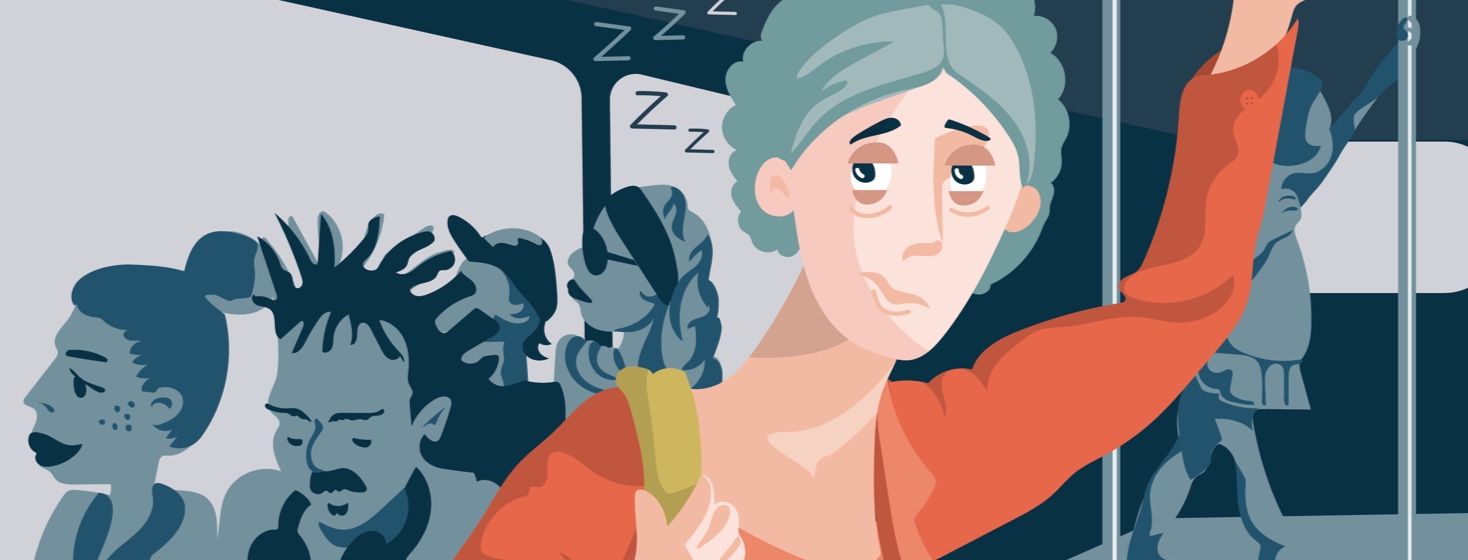Can Narcolepsy Take a Seat?
Imagine you’re on a train on your way home from work. It’s been a long day. Despite taking your regular nap at lunch you can feel yourself fading. The gentle rumbling movement is slowly rocking you. You know you don’t have much holding you back from a swift fall into slumber.
Do I ask someone for their seat?
It’s peak hour, so the train is packed, with not a spare seat in sight. The crowding also makes it really warm, which adds to the sensation of being slowly lulled into a stupor. You can feel yourself about to slip away, so you pinch at the skin on your upper arms in the most painful yet discreet way you can manage. Unfortunately, it does little to perk up your faltering mind.
In these moments you have to make a choice: do I continue to stand here, hoping beyond hope that I can maintain my alertness? Or do I give in and ask someone for their seat?
Narcolepsy is an invisible chronic illness
For me, it’s always been a complex question. At 6ft tall, I’m keenly aware of how dangerous it could be if I were to fall asleep and literally fall to the ground. I could easily take down another passenger with me. But as I’ve never actually fallen asleep standing up, I struggle to take this risk as seriously as I could.
On the other hand, I’m also a relatively healthy-looking young woman. I doubt anyone would ever guess that I was standing on the train battling a chronic neurological condition. In my impaired sleepy state, I’m also not well-equipped to explain my predicament. I might come across as extremely selfish if I decide to ask that someone else should move.
Overcoming shame from misconceptions
I’ll be honest here, I still haven't made it to the point where I’ve felt comfortable to ask for a seat. I’m a shy person at the best of times and when I’m at the point of extreme sleepiness I rarely make very logical decisions. Despite the fact I know I’m well within my rights to take a seat (for my own wellbeing and for others!) - I have never put that into practice.
I wish there was an easier way to legitimise myself in the moment than having to verbally explain to a stranger the ins and outs of my neurological condition. I just want to be able to sit down without feeling guilty or shamed for my actions. As misconceptions about narcolepsy run rampant in the general population, I can hardly just expect that any given stranger will simply understand my issue and accept that my request is legitimate.
My worst nightmare is being seen as rude and inconsiderate. Those who know me personally will hear me routinely complaining about those who ignore the needs of others in society. I can’t stand to be mistaken for an entitled space-taker. However, I do need to learn to take the potential risks seriously. In reality, there could be far worse outcomes than a bit of embarrassment.
Gaining the confidence to self-advocate
Right now, crowded train carriages are a thing of the past for me. My circumstances have changed and I'm lucky to only travel at off-peak times when there are plenty of seats! I’m also lucky that I’ve come to a point where I rarely get to the point of extreme sleepiness on transport anymore, thanks to an effective medication regime.
Despite all this, I like to believe that I now have greater confidence. That I'd be able to ask a stranger for their seat if the need arose. And who knows, maybe this could become a good opportunity to inform the general public about narcolepsy, one stolen seat at a time.

Join the conversation